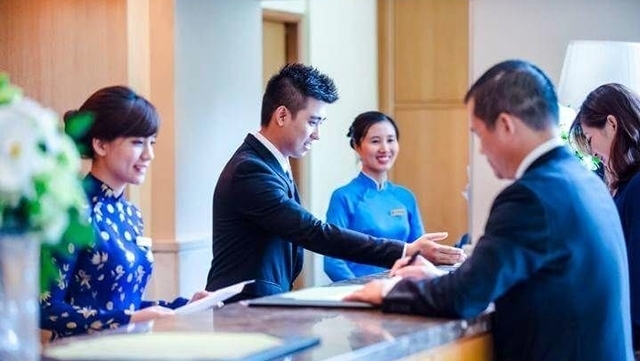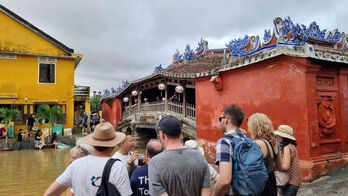
Illustrative image
According to data released by the General Statistics Office, in the first five months of 2018, revenue from food and accommodation services was estimated at VND 214,400 billion, 13 times higher than the revenue from travel tours (VND 16,200 billion). This figure demonstrates the decisive role of accommodation in the overall development of the tourism industry. Especially in the context of globalisation and international integration, the number of tourists visiting Vietnam and the demand for quality accommodation services, Luxury hotels are increasing rapidly. This fact requires that the investors and hotel owners must quickly innovate to catch up with the trend of smart travel and apply new technology to complete their services. It not only shows the level and business efficiency of each hotel but also creates a competitive advantage for the national tourism brand.
Luong Thanh Nam, General Director of Viet Hotel Solutions Corporation (VIETSOLUTIONS), affirmed that the fourth industrial revolution, with virtual reality technology and voice and face recognition, is a direct and powerful impact on the global hotel industry and the hotel industry in Vietnam. For this reason, the industry should try to keep pace with the trend, he added.
At present, in many of the world's hotels, the façade has become the place to convey interesting stories and messages about locals and hotels thanks to lighting technology and, thereby, the façade has improved the efficiency of advertising and interaction with visitors. In addition, the corridors and balconies are not only places to move but are also an exhibition space through the use of electronic screens. The traditional furniture is also gradually being replaced by intelligent furniture to make the most of space. Electric equipment is also centrally managed through push buttons on mobile controls. These new technology applications not only provide the best experience for travelers, but also make hotel management more convenient because all the facilities of the hotel are connected to the system, from opening and closing doors, to automatic controlling of room temperatures, and automated check-in and check-out, that can save human resources, costs and fuel. Meanwhile, the hotel manager also has the opportunity to be exposed to large data sources, analyse the tourist trends and habits of customers to propose promotional strategies. Smart travel trends require that hotels should consider the ability to integrate technology applications in operating and managing hotels and providing the best quality of service, from the design stage.
However, keeping pace with the Industry 4.0 is a large challenge for accommodation facilities in Vietnam because the modernisation requires a large investment in technology, equipment and highly qualified human resources. Meanwhile, in fact, most of the accommodation facilities in Vietnam are small and medium-sized, having limited financial capacity and human resources, and lacking high-tech equipment. For the workers, the Industry 4.0 also will cause risks, such as replacing workers with robots, reducing employment opportunities or changing standard rated capacity. Of course, the specialised services also require a high creativeness and communication skills in the hotel, skill and subtlety of humans. However, in the face the changing trend, workers also need to have the necessary knowledge and skills.
At the workshop "Housekeeping in the Industry 4.0 - Opportunities and challenges" recently held by Vietnam Executive Housekeeper Association (VEHA), the hotel managers and travel experts proposed many solutions, which aim to make the most of the advantages of the opportunities from revolution 4.0, to manage and develop hotels efficiently. According to Assoc. Prof. and Doctor Pham Trung Luong, the technology will first impact on the method of the promotion of hotels. Instead of the traditional way of advertising, hotels must provide visitors with information through their website, and even experiences based on virtual reality technology. In the management and operation of hotels, digital applications, biotechnology will also help the hotel use new energy sources, save electricity and water. According to Vice President of Vietnam Hotels Association Le Mai Khanh, it will need time and preparation in order to be able to apply the new technologies of the Industry 4.0 into the hotel industry in Vietnam. However, at the same time, hotels should also take advantage of the immediate advantages of innovating in marketing, collecting customer’s feedback to analyse habits and interests; from there, the hotels offers a proper promotional campaign. In addition, the data and hotel management will also change through online tools.
Also at the workshop, a lot of management software was shared by local and international delegates such as: LINE Messenger application, especially useful in managing hotels, supporting remote meetings, reporting room status, bar information, and multiple file format reports; OneNote free application on your phone and computer gives reminders for work./.
NDO
 Vietnam sees record foreign tourist arrivals despite stormy season
Vietnam sees record foreign tourist arrivals despite stormy season



